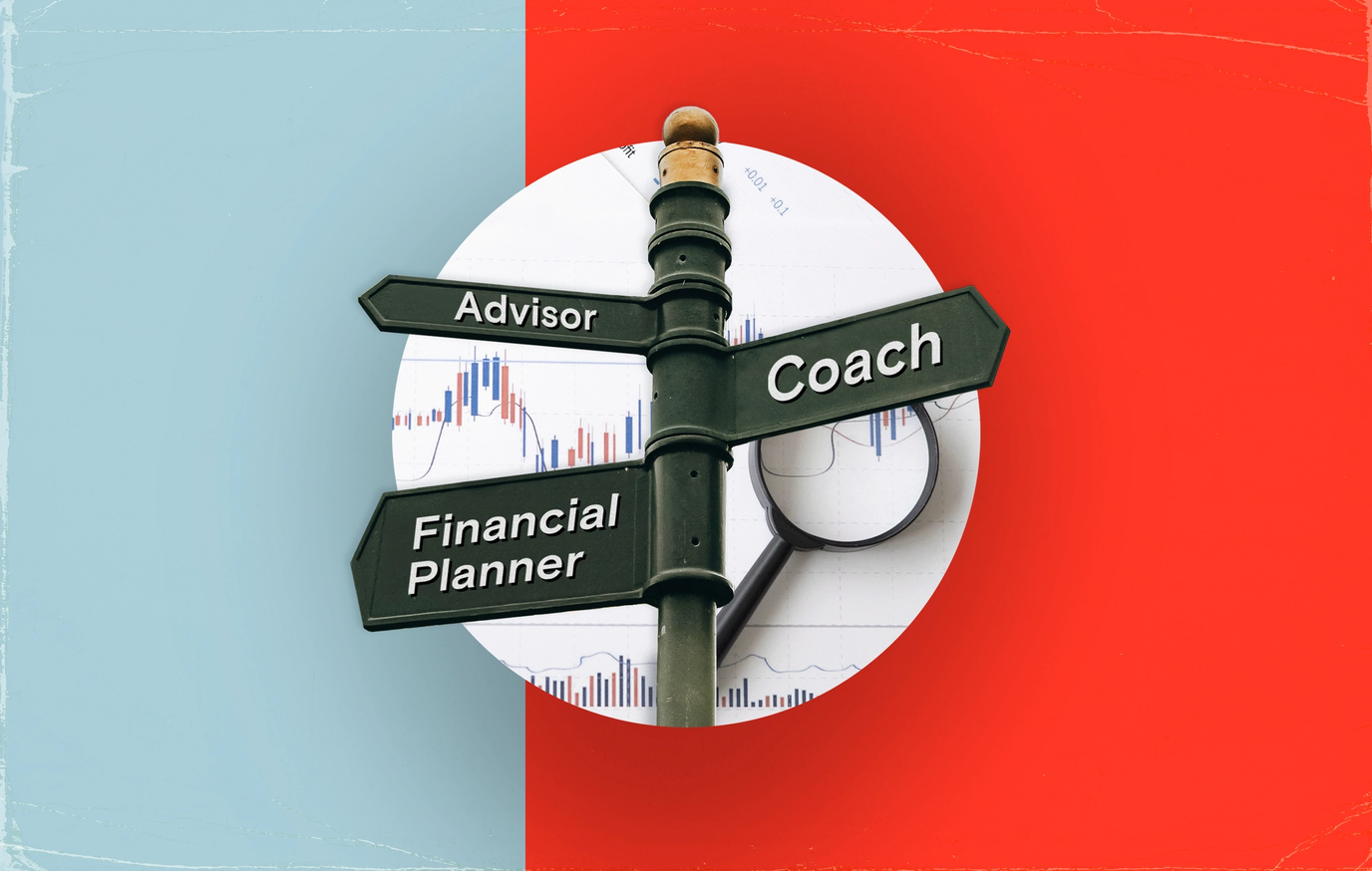
Rounding it up
Financial advisors manage money for clients, often in the form of managed investment portfolios.
Financial planners provide comprehensive money management services, including advice on saving, investing, and taxes.
Financial coaches are money experts that provide reliable advice to help you manage your own finances.
KOHO Extra account holders can talk to a financial coach at any time in the KOHO app.
Financial planner, financial advisor, and financial coach: they’re all different names for the same thing... right?
Well, not quite.
It turns out that while financial planners, advisors, and coaches all work to help us manage our personal finances, they each have slightly different skills and areas of expertise. As a result, it’s important to know the differences between each type of personal finance professional so you can find the right person to help you reach your financial goals.
If you’re wondering what the difference is between a financial advisor, planner, and coach, we’re here to help.
What does a financial planner do?
A financial planner is a personal finance professional that takes a holistic approach to wealth management. Their primary objective is to help you meet your long-term financial goals by assessing your current financial situation and opportunities for growth.
Financial planners in Canada often hold a Certified Financial Planner (CFP) designation from FP Canada, except in Quebec where they are certified by the Institut québécois de planification financière (IQPF).
When you meet with a financial planner for the first time, they’ll likely ask a series of questions about your income, expenses, current savings and investments, risk tolerance, and financial goals.
From there, financial planners will help clients establish a well-rounded savings and investment strategy. This financial strategy may include guidance with budgeting, tax planning, life insurance, and investing.
However, some financial planners specialize in certain aspects of personal finance, such as estate planning or investing for retirement. So if you’re looking for help with a specific aspect of personal finance, it may be worth seeking out a financial planner that specializes in your area of concern.
We should also note that many (but not all) financial planners manage assets on behalf of their clients. In these situations, financial planners generally work as fiduciaries. This means they must put your best interest at the forefront of their decision making without considering how their decisions affect their personal bottom line.
What does a financial advisor do?
A financial advisor is technically an umbrella term for a wide range of different personal finance professionals. In fact, the term can be used for anyone that manages money, including an insurance agent or a stockbroker.
Since the term is used quite loosely these days, it can be tricky to figure out precisely what financial advisors do. To keep things simple, we’ll focus on the most common type of consumer-facing financial advisor — the type of financial professional that helps manage your money through an investment portfolio.
While some financial planners also manage assets on behalf of clients, doing so is normally just one part of a planner’s day-to-day work. Meanwhile, financial advisors tend to focus mostly, if not exclusively, on researching, buying, and selling stocks, bonds, ETFs, mutual funds, and other investment vehicles for their clients.
Due to the fact that financial advisors are generally in charge of buying and selling securities for their clients, their profession is highly regulated. Depending on what types of assets financial advisors want to manage, they may need to complete certification and licensing courses.
At a minimum, anyone that sells mutual funds, bonds, or stocks in Canada needs to register with their provincial or territorial securities regulator. They will likely also need to take the Canadian Securities Course in order to obtain their securities license.
As with financial planners, some people who work as financial advisors are also fiduciaries. Financial advisors that work as fiduciaries also have an ethical and legal obligation to act in your best interest, which is pretty sweet if you’re trusting them to manage your hard-earned money.
"This means [financial planners] must put your best interest at the forefront of their decision making without considering how their decisions affect their personal bottom line."
What does a financial coach do?
While there are quite a few similarities between financial advisors and planners, financial coaches are in a league of their own.
Also known as financial counsellors, financial coaches are people who provide personal finance advice. Financial coaches work to provide you with the professional insight necessary to make educated and responsible decisions with your money.
While there’s technically no legal requirement for certification as a financial coach in Canada outside of Quebec, most experienced financial coaches will be certified to do their job. In particular, many financial coaches (including coaches that work at KOHO) will hold the Accredited Financial Counsellor - Canada designation.
As part of their job, financial coaches will meet with clients to discuss their current financial situation and goals for the future. They can help you establish a budget or a savings plan, too. Additionally, you can even ask a financial coach for advice on improving your credit score or paying off debt.
However, a financial coach is not your go-to person if you want someone to handle your finances or manage your investment portfolio. As a coach, financial coaches are there to guide you in your financial decisions—not to do the work for you.
You might be asking why you’d work with a financial coach if you could just pay someone to manage all your money.
The answer? Since financial coaches are never in charge of managing your money, you never have to be worried about hiring someone that’s putting their bottom line ahead of your own.
At the end of the day, experienced financial coaches are a one-stop-shop for anyone that wants reliable, transparent, and professional advice on managing their own finances.
SPEND SMARTER. SAVE FASTER
Financial planner, financial advisor, or financial coach: Which one is right for me?
At this point, you have a solid understanding of the differences between a financial planner, advisor, and coach. But, which financial professional is right for your needs? Let’s figure it out.
When to choose a financial planner
Financial planners are often a solid choice for people who want both financial advice and a hands-off way to manage their assets.
Before you start working with a financial planner, ask yourself the following questions:
Do I want professional advice on a wide range of financial topics from insurance to retirement planning?
Am I interested in allowing someone else to take control of my investment portfolio?
Is working with a fiduciary important to me?
If you answered yes to all three of these questions, a financial planner might be the best choice. Since financial planners take a comprehensive approach to money management, they’re a nice option for anyone that wants a professional to guide them through every aspect of their financial life.
Furthermore, since Certified Financial Planners are fiduciaries, they are often a great choice for people that want to be sure that they’re paying someone to work in their best interest. Do note, though, that hiring a financial planner can be pricey, but the cost is often worth it if you want professional help with all aspects of your financial well-being.
"Financial coaches work to provide you with the professional insight necessary to make educated and responsible decisions with your money."
When to choose a financial advisor
Financial advisors are a nice option for anyone that specifically wants help with their investing and saving strategies. Although you can sometimes find financial advisors that offer planning services, many consumer-facing advisors specialize in managing your assets.
If you’re considering hiring a financial advisor, there are a few things to keep in mind as you search for the right one, such as:
Determining if the advisor is registered with a provincial or territorial securities regulator
Assessing the advisor’s professional experience and education in finance or asset management
Obtaining recommendations from friends and family
Researching the history of disciplinary action against a financial advisor through the Canadian Securities Administrators
Asking about the total cost for the advisor’s services and how the advisor will be paid (e.g. through a percentage-based management fee, annual retainer, or commission)
Figuring out whether the financial advisor receives commissions from third parties that can affect their decision making
Determining if the financial advisor works as a fiduciary
This might seem like a lot of steps to take when hiring a financial advisor, but doing so is important to ensure that you’re getting the best possible advice. If possible, try to meet with multiple potential advisors before deciding on the professional that’s right for your needs.
SPEND SMARTER. SAVE FASTER
When to choose a financial coach
If you’re looking for a way to get straightforward advice about a wide range of different financial topics, a financial coach is often a sure bet.
With a financial coach, you can often schedule a quick meeting to ask a one-off question. Or, establish a long-term relationship with a coach who can help you establish a savings and investment plan.
Since financial coaches can offer a wide range of different services, there’s probably a coach out there that can help you achieve your money-related goals.
As we’ve mentioned, there’s no legal certification requirement for financial coaches in Canada. This makes working with an expert that holds the Accredited Financial Counsellor all the more important to ensure that you’re getting the advice you need.
Getting financial advice with KOHO
Our in-house coach also holds the Accredited Financial Counsellor - Canada designation, so you can feel confident in their advice.
While chatting with our coach, you can ask about any financial topic. Whether you’re wondering how to save all your cash back or want to figure out how to pay off credit card debt, we’ve got you covered. It’s all part of our mission to empower you with quality tools to help you manage your financial life.

About the author
Gaby Pilson is a writer, educator, travel guide, and lover of all things personal finance. She’s passionate about helping people feel empowered to take control of their financial lives by making investing, budgeting, and money-saving resources accessible to everyone.
Read more about this author